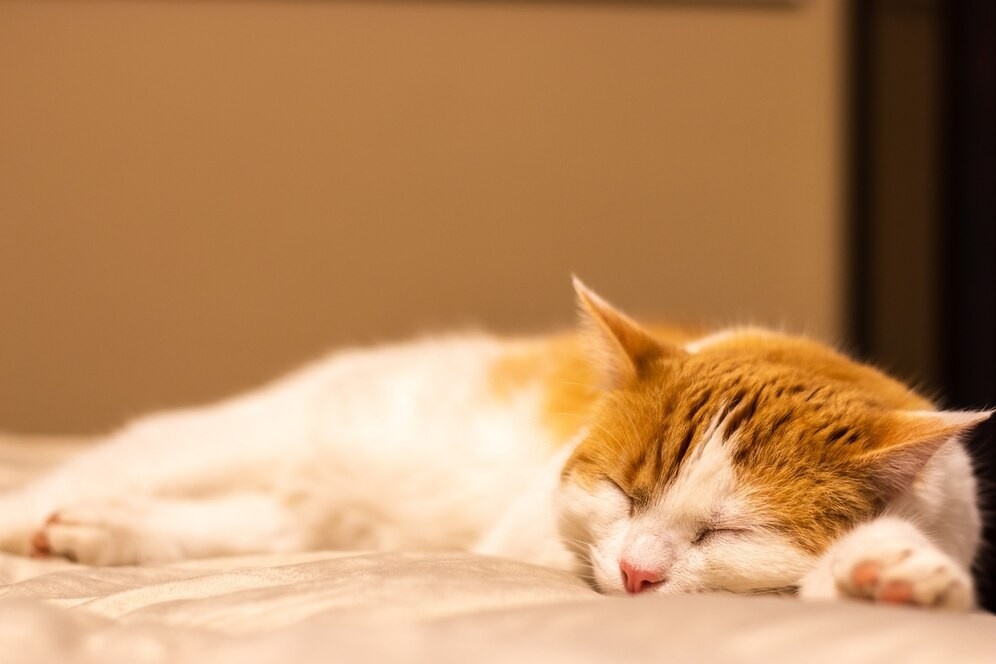Cats are known for their unpredictable sleep schedules. One minute they’re peacefully napping on the couch, and the next, they’re zooming around the house at midnight! If you’re tired of your cat waking you up at odd hours, you’re not alone. Cats tend to be more active at night, which can interfere with your sleep. The good news is there are simple ways to help your furry friend adjust their schedule so that they sleep when you do. In this article, we’ll share easy tips on how to get your cat to sleep at night and help you and your pet enjoy a quiet night’s rest.

Why Are Cats So Active at Night?
Before jumping into solutions, it’s helpful to understand why your cat might be wide awake when you’re ready to sleep. Due to their crepuscular nature, cats are most active during dawn and twilight. This instinct comes from their wild ancestors who hunted during these hours when prey like mice or birds are most active. Even though your indoor cat doesn’t need to hunt for food, they still have those natural instincts, which can make nighttime feel like playtime.
But don’t worry! While it’s normal for cats to be active at night, you can train them to adjust to your schedule. With the right steps, you’ll soon find your cat sleeping soundly when you do.
1. Play With Your Cat Before Bed
One of the best ways to get your cat to sleep at night is to tire them out before bedtime. Cats need physical and mental stimulation throughout the day, and if they don’t get enough, they may have too much energy left by the time you’re going to sleep.
Set aside some time in the evening to play with your cat. Use interactive toys like feather wands, laser pointers, or small balls to mimic their natural hunting behavior. Let your cat chase and pounce to burn off their extra energy. Try to have at least 15-20 minutes of active play, ideally right before your bedtime. This way, your cat will feel more satisfied and tired out, making it easier for them to settle down for the night.
2. Feed Your Cat Right Before Bed
Another trick that helps get your cat to sleep at night is feeding them just before you go to bed. In the wild, cats tend to rest after eating. You can use this to your advantage by giving your cat their last meal after your evening play session. A full stomach will encourage your cat to feel relaxed and ready to snooze.
Make sure this meal is the last thing you do before going to bed. Avoid giving them snacks in the middle of the night, as this can encourage them to wake up and expect food during your sleep hours. A regular evening meal will help train your cat to associate dinnertime with bedtime.
3. Create a Cozy Sleeping Space
Just like people, cats appreciate a comfortable and safe place to sleep. Providing your cat with a cozy spot of their own can encourage them to rest there, especially at night. Find a soft blanket or bed that your cat enjoys and place it somewhere quiet where they won’t be disturbed.
If you’re wondering how to get your cat to sleep with you, make your bed a cozy and inviting space for them as well. You can add a soft blanket or pillow at the foot of the bed where they can curl up. Over time, your cat may prefer to sleep near you if they feel comfortable and safe in your space.
4. Stick to a Routine
Cats love routines. They are creatures of habit, and if you set a regular schedule for feeding, playing, and sleeping, your cat will begin to follow along. To train your cat to sleep at night, keep the same routine every day. Play with your cat, feed them, and then head to bed at roughly the same time each night.
With consistency, your cat will start to understand that nighttime is for sleeping. If your cat is still waking up during the night, don’t give up—routine training can take a few weeks. If you have patience, results will appear soon.
5. Ignore Late-Night Attention-Seeking
It can be tough, but if your cat wakes you up at night for attention, it’s best to ignore them. Cats are smart, and they will quickly learn that meowing or pawing at you leads to attention. Even if it’s hard, resist the urge to talk to or feed your cat when they wake you up. Eventually, they’ll stop trying to get your attention during the night once they realize it won’t get them what they want.
This is especially important if you’re trying to figure out how to get your cat to sleep with you. Cats will wake up during the night naturally, and if they see that their actions don’t lead to a reward, they’ll learn to settle down again.
6. Provide Daytime Stimulation
A bored cat during the day means an active cat at night. If your cat spends most of the day lounging around, they’re more likely to be full of energy once you’re trying to sleep. Make sure your cat has plenty of stimulation during the day, especially if you’re away from home.
You can give your cat toys to play with, puzzle feeders to keep their mind active, or even set up a perch by the window where they can watch birds or squirrels outside. Keeping your cat busy during the day will help them feel more tired by bedtime.
7. No Midnight Snacks
Some cats will wake up at night expecting a snack, but this can lead to bad habits. It’s best not to feed your cat during the night. Stick to regular meal times, ideally with their last meal right before bed. If you reward your cat with food during the night, they’ll keep waking up expecting more.
By feeding your cat at set times, you’ll help them adjust to a healthy routine. Over time, they’ll learn that food comes during the day, not at night, which will help them stay asleep when you are.
8. Consider Calming Aids
If your cat continues to struggle with sleeping at night, there are calming aids available that might help. Products like feline pheromone diffusers or sprays can create a soothing environment for your cat. These products release synthetic versions of calming pheromones that cats naturally produce, helping them feel more relaxed.
You can use these calming aids in combination with the other tips to encourage your cat to sleep better at night. Always consult your veterinarian before using any new product to make sure it’s safe for your cat.
FAQs
1. Why is my cat so active at night?
Cats are crepuscular, meaning they are most active during dawn and dusk. Their wild ancestors would hunt during these hours. Even though your cat is domesticated, they still have these natural instincts, which can cause them to be more playful at night. With routine changes, you can adjust their schedule.
2. How can I get my cat to sleep through the night?
To help your cat sleep at night, engage them in active play sessions before bedtime, feed them right before you go to bed, and create a comfortable sleeping environment. Over time, your cat will learn to associate this routine with sleep. Ignore any attempts they make to wake you at night to reinforce nighttime rest.
3. What should I do if my cat keeps waking me up at night?
If your cat wakes you up at night, the best strategy is to ignore them. Giving them attention, even negative attention, reinforces the behavior. Over time, your cat will stop disturbing you once they realize it doesn’t lead to food or play.
4. How can I get my cat to sleep with me?
To encourage your cat to sleep with you, create a cozy and safe spot on your bed. Use a soft blanket or pillow that your cat enjoys. Establish a bedtime routine with playtime and feeding right before bed, so your cat is more inclined to settle down with you.
5. Are there calming aids that can help my cat sleep?
Yes, feline pheromone diffusers, sprays, or calming collars can help relax your cat. These products mimic natural pheromones that make cats feel safe and secure, which may help them sleep more soundly at night. Always consult your vet before introducing new products.
Conclusion
Helping your cat adjust to a sleep schedule that matches yours is not only possible but can be relatively easy with some effort and consistency. By playing with your cat, providing them with a cozy sleeping space, and sticking to a routine, you’ll be able to get your cat to sleep at night and enjoy peaceful nights once again.
Every cat is different, so it may take some trial and error to find what works best for your furry friend. The key is to be patient and consistent. Soon enough, both you and your cat will be enjoying restful nights together. For more helpful tips on taking care of your cat, be sure to check out cattoptips for expert advice on how to keep your feline happy and healthy!


